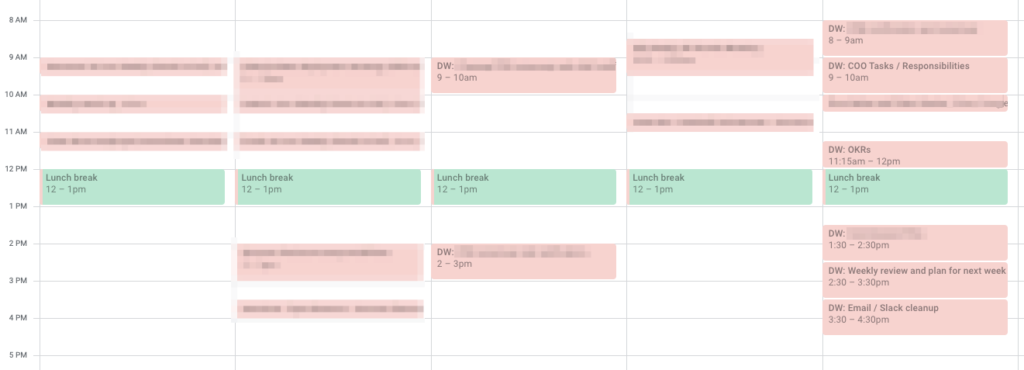Over the last three days I’ve been making small changes to my original deep work strategy. My goal is to find a system that maximizes my professional effectiveness by helping me prioritize my most important tasks and makes time to focus on those tasks.
If you’ve been following my blog, those two words, prioritize and focus, may have caught your eye. Interestingly, they’re the same words I used to summarize what OKRs can help do for a business.
In a lot of ways, the concept of deep work feels like applying the principles of the OKR system at the individual level. It should come as no surprise then that in Deep Work Cal Newport draws parallels between how a business goes about executing its strategy and how an individual can go about integrating periods of deep work into their professional life.
The business management system that Cal references in the book is called 4dx, and while not exactly the same as the OKR system espoused by John Doerr, there are many similarities.
In any event, while interesting, that’s all beside the point. I came here today to tell you about some changes I’ve made with the goal of working more deep work into my workday.
Scheduling Deep Work
The primary change I’ve made over the past 3 days is to schedule times when I will do deep work.

My scheduling process involved several steps:
- I identified exactly what I wanted to work on.
- I set a start and end time.
- When I began the focused work time I snoozed Slack notifications and added a status indicating I was unavailable.
- I moved to a new browser window where I wouldn’t see my email inbox.
- I set my phone to Do Not Disturb.
- I left my standing desk and found another quiet spot where I could sit, focus, and work.
Preliminary Results
So how did it go?
Well, early results were very good.
I made a lot of progress on several projects which required focus. I feel like I was more productive than I would have otherwise been and I do think I worked on a wider range of projects that require focused attention than I would have otherwise worked on.
At the same time, I have to acknowledge it wasn’t perfect.
There were times I struggled to actually stop looking at Slack. One of my worst habits is that I hate waiting, even a few seconds, for a webpage to load. What happens is that I open a webpage that’s going to take several seconds–such as a Google Doc–and rather than wait for it to load I switch over to Slack and review a channel or two while I’m waiting. A lot of the time this leads to me spending 5 minutes on Slack rather than 5 seconds.
During one of my sessions today I ignored the start of the session and kept right on engaging in relatively low-value conversation in Slack. That’s not great.
Further Refinements
There a few further refinements I want to make to my deep work strategy:
- I have to respect what I schedule. Once scheduled I need to treat deep work as if it were a meeting like any other. I’m not sure how to put teeth to these commitments to make them stick, but I need to figure that out.
- I think I need to outright close my email and Slack during deep work sessions, not just snooze notifications. It was too easy to swap back to Slack while waiting for something to load and it’s clearly something that I’ve simply built muscle memory around.
- I should probably limit how many deep work sessions I schedule per day. I scheduled 6 today, and that was too many. I think I’d have been more effective if I’d scheduled no more than 3 or 4 in any given day and made some of them longer than an hour. There were two different tasks today that ultimately needed longer than an hour.
Overall, I feel like deep work served me well this week and it’s well worth further investment. I’ll continue to refine things over the coming weeks and see where this new habit takes me.
